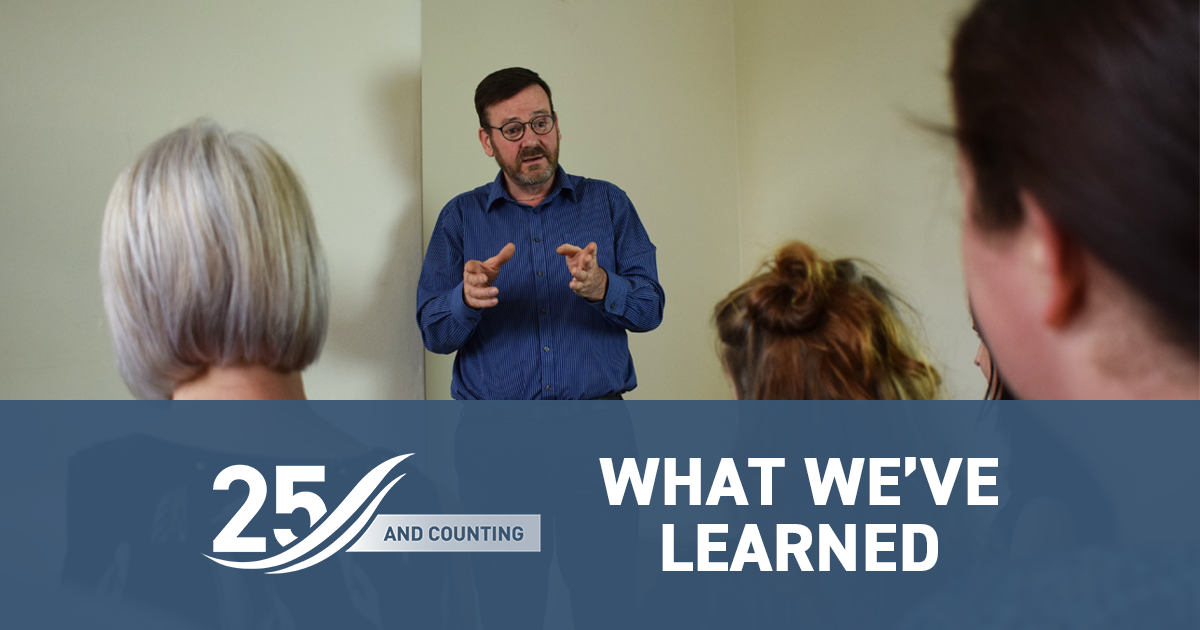
Posted on: November 18th, 2024

To celebrate our 25th Anniversary this year, we sit down with Founder, Dr Mike Talbot, to look back at some of the key moments in UK Mediation's history.
In this eleventh entry, Mike shares some of the things we've learned over the years.
I was asked for some thoughts for this piece on what we as an organisation have learned over the last 25 years. Quite a tall order, given the vast range of training courses we have run in that time, and the great number of mediation cases that we have facilitated. I could probably come up with a list of 25!
However, I’ll try for a top five for the services we offer, and another five for training courses. Here goes...
Starting with mediation cases, facilitated meetings, and other forms of conflict resolution services, I would say the top five would be:
1. There are two sides to every story
Never, and I mean never, have the parties to a conflict told the same story to our mediator about how their conflict began and developed. Neither reality is right nor wrong. Value that.
2. Mediation cases don’t have to end with an ‘agreement’
There is something of an obsession among especially just-starting-out mediators that there has to be a contract-like agreement at the end of the process. Not at all. Don’t force ‘agreement’.
3. Conflict is best resolved at the earliest point in its development
Most cases that fail to reach a positive outcome do so because the situation has been referred to mediation too late. Refer early.
4. Confidentiality counts
There is more to every dispute than meets the eye, and in mediation the parties have more to say than they have yet said up to the present point. But only if they believe that their words won’t go any further. Be trustworthy.
5. Encourage the argument
As mediators we are allowing, even encouraging the argument, albeit within an agreed set of rules. We have to learn not to fear that. Drive into it.
For training events, right from shorter workshops up to our 40-hour, internationally-accredited qualification courses, my second list would be:
1. There is always more to learn
When you look at mediation from a psychological perspective as we do, there is an incredibly rich seam of knowledge and insight waiting to be mined. It makes our learners’ training experience rich and varied. Enjoy it!
2. The group’s expertise is a valuable learning resource
Learners come to our courses with their own histories, biases, expectations, and hopes. Tapping into these valuable resources makes training doubly interesting. Use them.
3. One size does not fit all
Different groups need different training approaches for different reasons at different times. Training has to be modelled to the learning need of each group. Customise it.
4. Resolving conflict requires that you understand the people who are in conflict
The psychological approach requires that we look beyond the presenting arguments, positions, and insistences. We need to step into people’s frames of reference if we are to understand the conflict from their perspective. Subjectivity matters when training new mediators and conflict resolvers.
5. Good training resources are key
Some years ago we invested an extraordinary amount of money in making some professionally-produced and broadcast quality films with realistic depictions of various disputes and their resolution through mediation. This, along with having brilliant trainers and high-end courses, has a lot to do with where we find ourselves today. Quality matters
So, those would be some of the key learning points for me from the last 25 years. It was hard to get it into just ten bullet points, but I think these are some of the more important ones.
I don’t say we’ve finished yet, given that mediation and mediation training are certainly endeavours that embrace the idea of Lifelong Learning, and we have our collective eyes and ears wide open for whatever we can learn next.